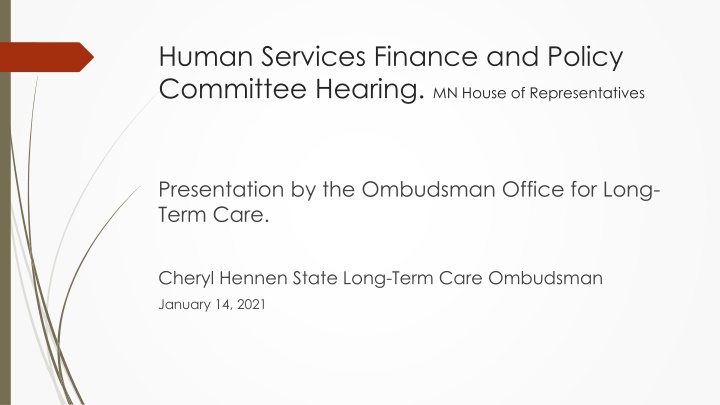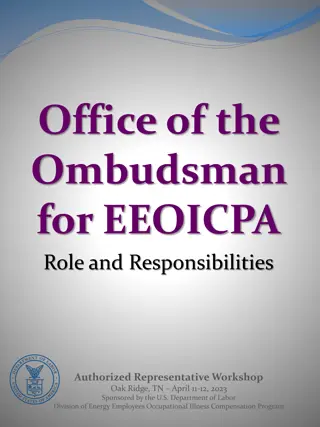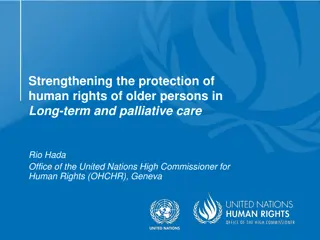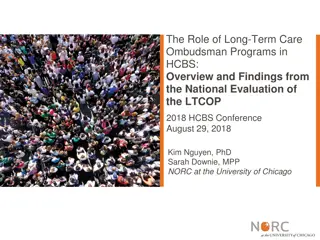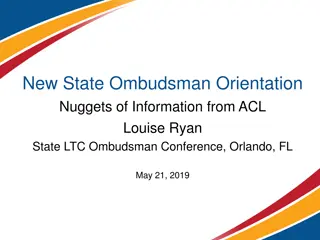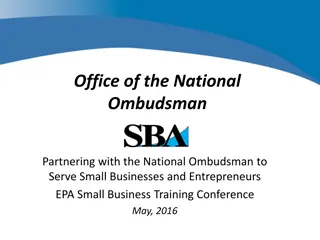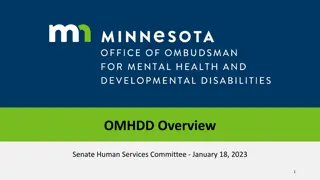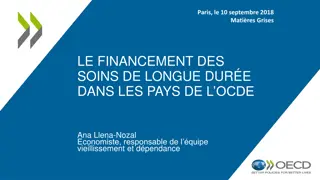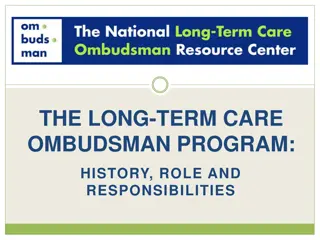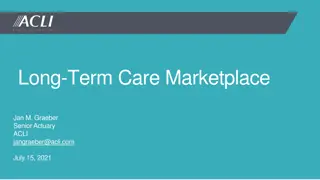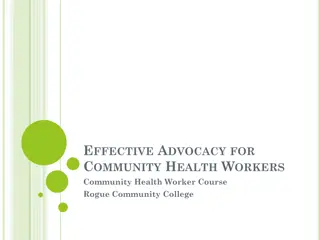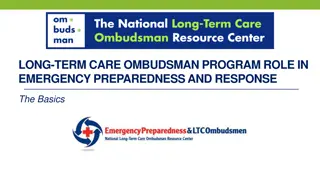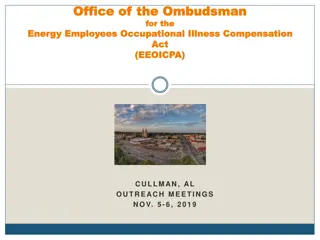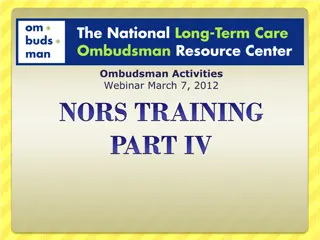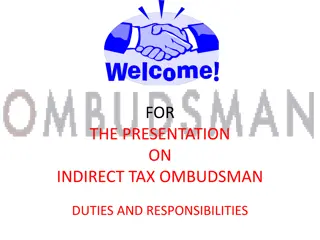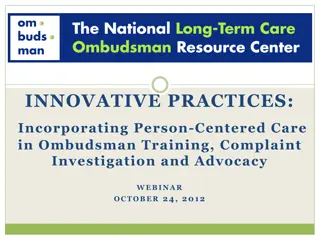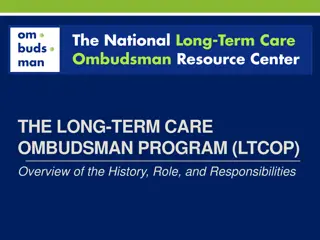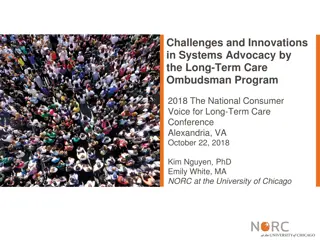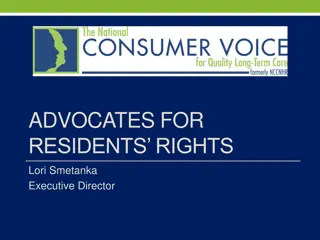Enhancing Long-Term Care Services: Ombudsman's Advocacy
The Office of Ombudsman for Long-Term Care in Minnesota works to improve the quality of life and services for long-term care consumers through advocacy, education, and empowerment. Established under the Older Americans Act, the program investigates and resolves complaints, educates residents and staff, and advocates for residents' rights. Funding comes from various sources including federal grants and state appropriations, enabling the program to provide person-centered client advocacy without income or citizenship requirements.
Download Presentation

Please find below an Image/Link to download the presentation.
The content on the website is provided AS IS for your information and personal use only. It may not be sold, licensed, or shared on other websites without obtaining consent from the author.If you encounter any issues during the download, it is possible that the publisher has removed the file from their server.
You are allowed to download the files provided on this website for personal or commercial use, subject to the condition that they are used lawfully. All files are the property of their respective owners.
The content on the website is provided AS IS for your information and personal use only. It may not be sold, licensed, or shared on other websites without obtaining consent from the author.
E N D
Presentation Transcript
Human Services Finance and Policy Committee Hearing. MN House of Representatives Presentation by the Ombudsman Office for Long- Term Care. Cheryl Hennen State Long-Term Care Ombudsman January 14, 2021
Office of Ombudsman for Long-Term Care Mission statement: OOLTC works to enhance the quality of life and quality of services for long-term care consumers through advocacy, education and empowerment.
History The term Ombudsman was originally coined by members of the Swedish government dating back to 1809. An official of high esteem that would intercede as a highly-regarded voice for citizens with complaints and work to resolve concerns. The Ombudsman for persons in nursing homes was prompted by Dr. Arthur S. Flemming, who served as the Commissioner on Aging to the office of President Richard Nixon Started as a demonstration project in 1974 in four States Success of the program shifted from establishment to expansion. An amendment was added to the Older Americans Act in 1978 mandating every state provide ombudsman services .
Legal Authority and Governance The Older Americans Act (OAA) established the Ombudsman Program. Older Americans Act of 1965. Section 712 45 CFR Part 1321 and 1324 LTCO Program MN Statute 256.9742 DUTIES AND POWERS OF THE OFFICE. Administered through the Minnesota Board on Aging since 1980 Central Office in St. Paul Regional Offices throughout Minnesota Certified trained volunteers statewide.
Program Funding OOLTC Funding Sources 2% Ombudsman Federal 35% CARES Act 47% RFACE State Appropriation MHM 4% 12%
Person-centered Client Advocacy The Office of Ombudsman for Long-Term Care serves adults seeking or receiving licensed long-term care services and supports in Minnesota. - No income screening - No citizenship requirement - No referral requirement - Calls welcome from residents, family, friends, facility staff, others - Free service Advocates for residents of nursing homes, board and care homes, assisted living facilities, and other similar adult care facilities Ombudsmen always work from the perspective of the resident, advocating for the resident s requests. Investigate and resolve complaints that relate to the health, safety, welfare, and rights of residents Educates residents, their family, and facility staff about residents rights, good care practices, and similar long-term services and supports resources Provides technical support for the development of resident and family councils Make recommendations to state and federal agencies, to the Legislature, to Congress, and to others to improve the quality of life of residents.
Facts: Regional Ombudsmen do not: Conduct licensing and regulatory inspections or investigations; Perform Adult Protective Services (APS) investigations; or Provide direct care for residents. Right to Confidentiality Strict federal requirements regarding disclosure of Ombudsman program information. Resident-identifying information cannot be disclosed without resident consent, the consent of the resident representative, or a court order. These disclosure requirements prohibit Ombudsman programs from being mandatory reporters of suspected abuse
Elder Care and Vulnerable Adult Protection Act 2019 May 22, 2019: Governor Walz signed Elder Care and Vulnerable Adult Protection Act of 2019 Bill established funding for an increase of 17 OOLTC staff Increase regional staff, Deputy, 6 additional support staff 1 FTE Electronic Monitoring Region ombudsmen (RO) serve residents in geographic regions around the state. Call the central intake line at 651-431-2555 to find your regional ombudsman.
Change (?) March 2020 Temporary transformation of Ombudsmen Services to virtual presence What Did Not Change: Right people have to expect quality individualized care Ombudsmen Office Mission Role and Responsibilities of Ombudsmen staff Receiving Resident experiences Tracking and Recording Emerging trends
Top Issues/Trends Restrictions on Visitation: Comparison: Pre-COVID vs Post-COVID Pandemic of isolation Transfer/Discharge: Emergency Executive Order Complaint comparisons : from 10/01/2019-09/30/2020=445 increase from 178 over last year. 244 of the 445 occurred since COVID. Another 70 discharge complaints received from 10/01/20 Dec. 2020 Staffing: Inadequate staffing LTC workers need improved support
Conclusion Organize our care systems around the people who live & work in long-term care settings to enhance quality of life; focus on equity and inclusion free of discrimination. Support and allow Residents of Long-Term Care settings Regular In-Person Contact with loved ones of choice during the COVID-19 Pandemic Staffing : COVID-19 exposed long-standing weaknesses of inadequate staffing in our Long-Term Care System. We need to work together and invest in the LTC work-force in sustainable ways. Assure access to Adequate PPE and COVID Testing. Uphold commitment to transparency and regular communication
Glimmer of Hope Role out of vaccine Priority given to residents in Long-Term Care settings and staff Information on supply and distribution is constantly changing Positive resident feedback Ombudsmen staff resume in-person presence
Thank you Cheryl Hennen, State Long-Term Care Ombudsman cheryl.Hennen@state.mn.us
